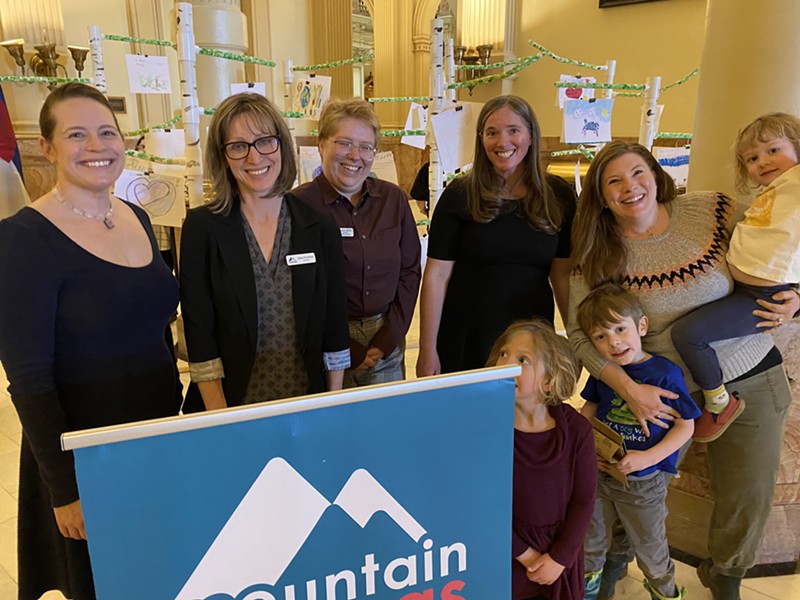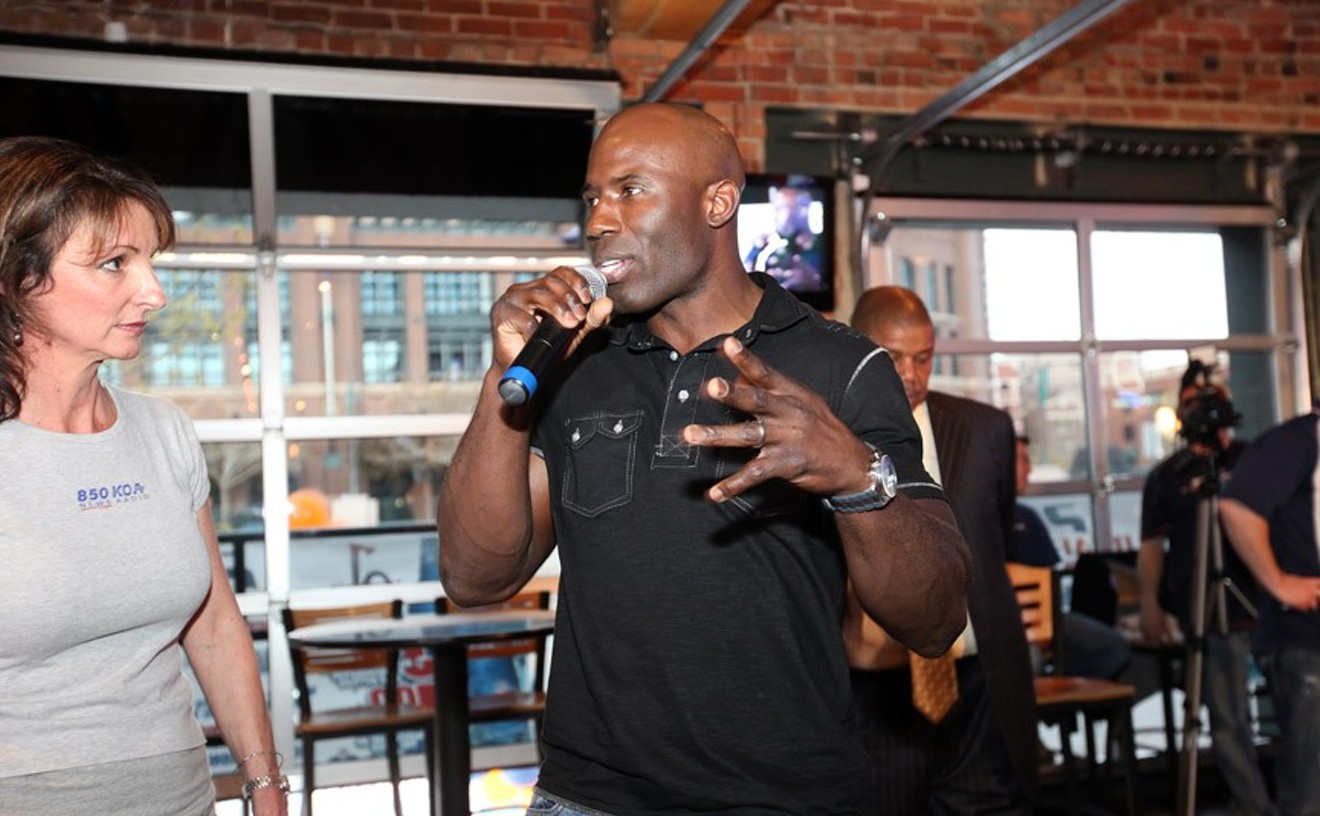Cayenna Johnson, an Aurora mom, has firsthand experience with the dangers of air pollution. Her son, now sixteen, was hospitalized at four years old after a cold turned into something much worse.
“I just did not understand,” Johnson says. “I remember thinking, 'What did I miss? What is happening?'”
It was August, Johnson says, and her son’s cold combined with the air pollution and rendered him unable to breathe. Johnson hadn't grown up in an area with high air pollution, so she didn’t realize right away what was causing her son’s issues. As he’s grown older, she’s learned that if he gets a cold and then goes outside when the air quality is poor, he has a high chance of being hospitalized because of his asthma.
“It’s a huge deal,” Johnson says. “It’s impacted sports, impacted schooling. It’s very costly for us. He has to take medication twice a day.”
Johnson says she checks air pollution levels before she lets her son go outside. Even going to school can be tricky if air pollution is high.
In 2022, the Colorado Department of Public Health & Environment issued 46 Ozone Action Alert days. Ozone tends to be at its highest during the summer; ozone molecules form when volatile organic compounds (VOCs) and nitrogen oxide (NOx) mix with heat and sun. It can aggravate lung conditions such as asthma and chronic obstructive pulmonary diseases; it’s also particularly dangerous for young children and adults over 65.
Johnson wants to avoid permanent damage to her son’s lungs, and so has purchased an air filter for his room, as well as extra filters for their home furnace. She's even considering leaving Colorado for a place with less pollution.
The Front Range is in violation of the EPA’s National Ambient Air Quality Standards for ozone, and reworked its plan to address ozone in December 2022. At the time, many advocates said the plan didn’t implement enough measures to bring ozone down to a safe level.
Some of those advocates, including the Colorado Public Interest Research Group and Colorado Mountain Mamas, are still hoping the state can take action. They worked together on the February 21 event, which included an art installation made by mothers and their children in the style of an aspen grove crafted from PVC pipe, with suggestions for clean air measures the legislature could take hung on the tree branches.
“I want, in the future, to make sure that everyone in Colorado can exercise outdoors while being safe,” Max Dial, a freshman at Denver's North High School, told Westword after the event. “I want to make sure that in the future people are able to do the same things that I love to do, like go hiking.”
Dial, who spoke at the event, says he spends as much time outdoors as he can, and so air pollution has always been a concern for him. He gets air-quality alerts through the weather app on his phone and doesn’t go on runs if the air quality is too bad. Last summer, his soccer team had to cancel practice twice because the air quality was too poor for outdoor exercise.
“I know a lot of people my age are also worried about it,” Dial says. “Especially when those practices were canceled, I heard from a lot of my teammates, like, wow, this is a big problem. I heard them say that they were actually worried to be outside and exercising because they had asthma.”

State representatives Jennifer Bacon (far right) and Jenny Willford (far left) attended the event on February 21.
CoPIRG staff
State representatives Jennifer Bacon and Jenny Willford attended the event. They are just two of the many elected officials the clean-air advocates hope will take action this year. CoPIRG released an ozone agenda at the event, detailing policy ideas the legislature could take.
“We're not going to solve our ozone pollution problem by the summer, but what set of policies and actions can the legislature take right now, this spring, that can start to lower the amount of ozone-forming pollution we're allowing to enter our air?” asks Kirsten Schatz, CoPIRG Foundation clean-air advocate.
The plan includes policy suggestions ranging from incentivizing e-bikes and electric lawn equipment to incentivizing transit and reducing ozone precursor emissions from industrial areas and the oil and gas industry.
“We're not going to solve the problem with e-bikes alone,” Schatz says. “We're not going to solve it just with lawn and garden equipment, or even just with oil and gas.”
In its agenda, CoPIRG used available information to estimate the amount of pollution that could be avoided with each policy it suggested, finding that even replacing 10 percent of gas-powered lawn equipment with electric equipment could prevent 131 tons of NOx and 602 tons of VOCs from being emitted, which means that incentives for people to switch over could help combat the ozone problem.
“That’s a great place to start, and eventually we need to shift all gas-powered equipment over to electric, but there are so many people who already want to make that switch, so anything we can do to sweeten that deal and accelerate that will make a big difference,” Schatz points out.
The plan calls for more policies like free-fare August, when transit agencies across the state offered free rides during August 2022 thanks to legislation from earlier that year. RTD, which serves metro Denver, saw a monthly ridership of 6,360 in August 2022, compared to 4,669 in August 2021.
“It shows when we invest even just a little bit in transit, there's an appetite there, and every car trip that we can replace has a tangible impact on our air quality,” Schatz notes. “Down the road, I want to think bigger, and we want to see what else we can do to increase the frequency of transit service and increase the efficiency and safety.”
Another policy idea calls for pausing some oil and gas activities during the height of ozone season. Even if those same oil and gas activities occurred in other months of the year that are cooler, less ozone would form, so shifting those activities out of ozone season could help.
Schatz has two children herself. Pushing for improvements in policy is one way that she and the other moms who participated in the event work to build a better future for their kids.
“Now that I'm working on these issues every day, I do have more hope, because I see that there's so many actions that we can take,” she says.
Johnson says air pollution has in many ways defined her son’s childhood, and she believes more people should recognize the importance of improving air quality.
“I'm very hopeful that in the future we can change this and improve air quality over time,” she says. “That will make the quality of lives of everyone, especially children, improve.”











